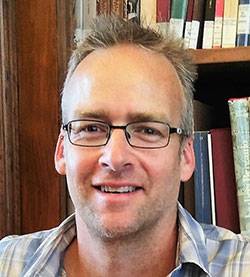
Contact Us
Institutional Communications
Bureau of Mines Building, Room 137
Laramie, WY 82071
Phone: (307) 766-2929
Email: cbaldwin@uwyo.edu
Serengeti Wildebeest Migration Topic of Seminar at UW-NPS Research Station July 6
Published July 03, 2023

Grant Hopcraft
Attendees will be treated to an African ecosystem lecture focusing on the Serengeti wildebeest migration during the weekly Harlow Summer Seminar Thursday, July 6, at the University of Wyoming-National Park Service (UW-NPS) Research Station. The facility is located at the AMK Ranch in Grand Teton National Park.
Grant Hopcraft, a senior lecturer in the University of Glasgow’s School of Biodiversity, One Health and Veterinary Medicine, will present “The Serengeti wildebeest migration: ecology and conservation in a changing world.” The event begins at 5:30 p.m. with a barbecue, followed by the 6:30 p.m. seminar. The events are free and open to the public, although a $10 donation is suggested.
Formerly called the AMK Ranch Talk Series, the Harlow Summer Seminar Series is named after retired UW Department of Zoology and Physiology Professor Hank Harlow, who helped make the UW-NPS Research Station a significant center for research and community outreach. Harlow began the popular weekly public seminars during the summer months.
In his lecture, Hopcraft will discuss Africa’s Serengeti, the iconic ecosystem that is best known for the epic migration of more than 1.2 million wildebeest, plus 250,000 zebra and 200,000 gazelle. He says large migrations of animals were once common in many parts of the world, but they have been collapsing globally.
“What makes the Serengeti so special? Why do we not see Serengeti-type ecosystems everywhere?” Hopcraft asks.
Hopcraft will explore the underlying natural history that leads to the diversity and abundance of animals in the Serengeti’s ecosystem. The lecture will reflect on years of ecological research and management decisions that have provided insights about how ecosystems work and what lessons the Serengeti has taught researchers.
Hopcraft’s research concentrates on aspects of applied ecology and management, particularly African ecosystems. He leads the Serengeti Biodiversity Program, where he has collected and studied migratory wildebeest, zebra and eland since 1999.
The UW-NPS Research Station provides a base for university faculty members and government scientists from around the world to conduct research in the diverse aquatic and terrestrial environments of Grand Teton National Park and the greater Yellowstone area.
A cooperative effort between UW and the NPS for the past 66 years, the research station is located on the AMK Ranch historic district on a peninsula extending into Jackson Lake near Leeks Marina.
Contact Us
Institutional Communications
Bureau of Mines Building, Room 137
Laramie, WY 82071
Phone: (307) 766-2929
Email: cbaldwin@uwyo.edu
